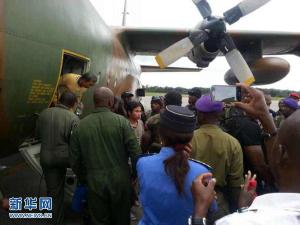With Global Pressure, Nigerian Government Acts Quickly to Free Foreign Hostages
 One of the often unintended side effects of an increasingly globalized world is that, even as local cultures and ideologies become globalized, they are accompanied inherently by their respective problems. Since 2009, but particularly in the past eight months, Boko Haram has become notorious for their continuing attacks in Nigeria and Northern Cameroon, starting with the famous kidnapping of over 270 schoolgirls from Chibok on April 14, 2014. On July 27, Boko Haram struck again, this time kidnapping 27 hostages, ten of which were Chinese, from the village of Kolofata, and killing several others. Many are surprised at the expediency with which both the Cameroonian and Nigerian governments recovered these hostages, as opposed to the 200 plus school girls who still remain captive more than six months later.
One of the often unintended side effects of an increasingly globalized world is that, even as local cultures and ideologies become globalized, they are accompanied inherently by their respective problems. Since 2009, but particularly in the past eight months, Boko Haram has become notorious for their continuing attacks in Nigeria and Northern Cameroon, starting with the famous kidnapping of over 270 schoolgirls from Chibok on April 14, 2014. On July 27, Boko Haram struck again, this time kidnapping 27 hostages, ten of which were Chinese, from the village of Kolofata, and killing several others. Many are surprised at the expediency with which both the Cameroonian and Nigerian governments recovered these hostages, as opposed to the 200 plus school girls who still remain captive more than six months later.
What could have motivated the Nigerian and Cameroonian governments to mobilize sufficient military and diplomatic resources to make the recovery of these hostages so quickly, while so many others remain unaccounted for months later? This could be due to varying forms of domestic, or perhaps more importantly, international pressures.
Boko Haram’s choice to kidnap ten Chinese hostages is a strong indication of China’s increasing presence in sub-Saharan Africa. China’s influence in the region over the past ten years has been increasing steadily along with its investment in it. The bulk of Chinese aid and investments in West Africa has been allocated towards energy generation, communications, and transportation; it therefore came as no surprise that ten of the 27 hostages captured in this raid happened to be Chinese road construction workers. This incident prompted the immediate response of numerous Chinese foreign officials, including Chinese Foreign Ministry spokesman Hong Lei, who specifically requested that the relevant country’s government earnestly ensure the safety of Chinese personnel in the area, and protect Chinese investments in the region.
China’s direct involvement with local issues and politics is inevitable. Due to Boko Haram’s threatening activities, the Chinese are steadily being encouraged to act, not just as foreign investors in the region but also in the interest of their citizens.
Furthermore, the different nationalities represented within this group of hostages proves the way in which Boko Haram’s actions have begun to, and will likely continue to, affect more than just the local Nigerians. The fight against Boko Haram has also been a daily reality for most Northern Cameroonians since early 2010, when Boko Haram’s insurgent activities began taking place in Northern Cameroon. This caused local governments to dispatch hundreds of troops to secure the Nigerian border. What seemed to be one of the swiftest hostage-recovery military operations in this area so far, followed, the kidnapping of Françoise Agnes Moukouri, wife of the Vice Prime Minister of Cameroon, Amadou Ali.
After being released by Boko Haram, Seini Boukar, a Muslim cleric, mayor, and traditional ruler of the Cameroonian town of Kolofata, argued that such an experience can be psychologically paralyzing for the victims, their families and friends. This rings true particularly when community leaders like himself are involved: “In African Culture, when a leader is kidnapped, so is the whole community.” This is because, beyond controlling access to resources necessary for significant military and political action, community leaders (especially traditional ones like Seini Boukar) are also placed at the center of a community's culture. This perhaps motivated Cameroonian and Nigerian officials to recover Boukar much quicker.
Presently, not much has been said about the irony that Nigerian and Cameroonian governments located and recovered 27 hostages within four months, but are still unable to communicate a concrete plan to recover the school girls who remain hostage more than six months later. The recovered hostages, as opposed to the many unrecovered girls captured on the night of April 14, just happened to include people who were privileged to have close ties with either local politicians or powerful foreign investors; this distinction between the two groups, perhaps, has created the discrepancy in the outcomes of the recovery efforts separately geared towards them.
